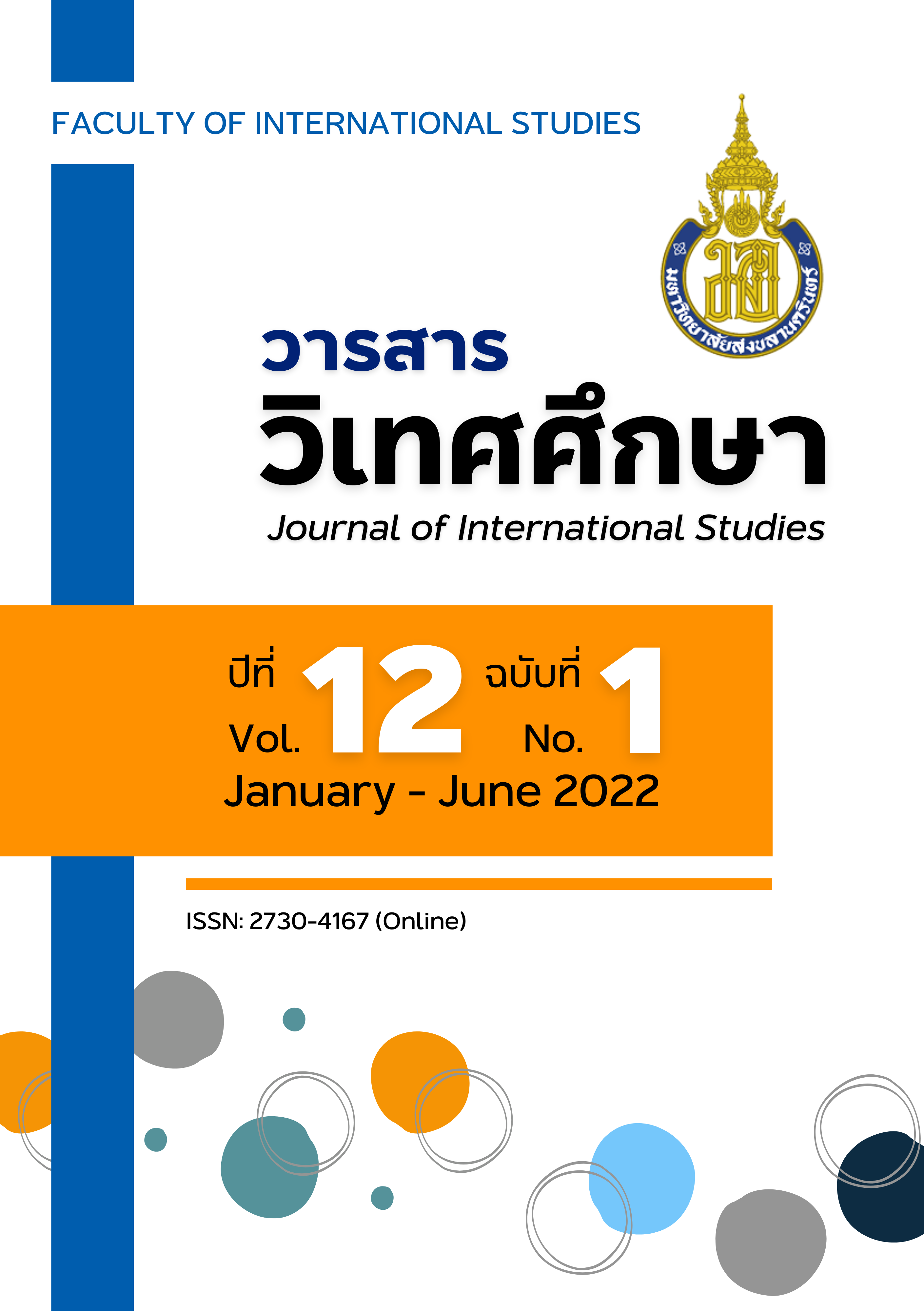Gastronomy Tourism Promotion: Opportunities and Challenges of Street Food in Phuket
Main Article Content
Abstract
This study aims to understand the expectations of government’s promotional campaign of street food and impacts of the campaign on street food vendors in Phuket. Phuket is recognised by the United Nations Educational, Scientific, and Cultural Organisation (UNESCO) as “Creative City of Gastronomy” since 2015. The local government organises campaigns to promote street food in order to boost gastronomy tourism and also helps on livelihoods of street food vendors. This research is conducted by ethnographic methods of participant observation, in-dept interview, and case studies examination. The informants included street food vendors from night markets or walking street in Phuket, and the representatives from the official authority of Phuket. Data collected was examined by discourse analysis and thematic analysis. The results reveal that the Phuket government expects to attract visitors by introducing a gastronomic route of Phuket local food with less attentive to street food. Besides, the street food vendors could not get advantages from the gastronomy tourism promotional campaigns due to the fact that participated vendors are selected by the Phuket government according to popularity and capital availability. However, the Phuket government intends to implement food hygiene and sanitation policies to maintain the quality and safety of street food.
Article Details

This work is licensed under a Creative Commons Attribution-NonCommercial-NoDerivatives 4.0 International License.
Statements and opinions expressed in articles herein are those of the authors and do not necessarily reflect the position of the editors or publisher.
Article, information, text, image, etc. which are published in Journal of International Studies, belong to Journal of International Studies. If anybody or any organization would like to use part or whole of them, they must receive written permission from Journal of International Studies before usage.
References
Bank of Thailand. (2019). A better understanding of Thailand’s informal sector. Retrieved April 10, 2020, from https://www. bot.or.th/Thai/MonetaryPolicy /ArticleAndResearch/FAQ /FAQ_156.pdf
Berg, P. O., & Sevón, G. (2014). Food branding places – A sensory perspective. Place Branding and Public Diplomacy, 10, 289-304.
Bhowmik, S. K. (2005). Street vendors in Asia. Economic and Political Weekly, 40(22-23), 2256–2264.
Chalamwong, Y., & Meepien, J. (2013). Social protection in Thailand’s informal sector. Retrieved April 10, 2020, from https://tdri.or.th/wp-content/uploads/2014/09/ t5d2013-final.pdf
Chen, M. A. (2004). Rethinking the informal economy: Linkages with the formal economy and the formal regulatory environment. Retrieved April 10, 2020, from https://www.findevgateway.org/sites/default/files/mfg-en-paper-rethinking-the-informal-economy-linkages-with-the-formal-economy-and-the-formal-regulatory-environment-sep-2004_0.pdf
Chen, M. A. (2012). The informal economy: Definitions, theories and policies. United Kingdom: Women in Informal Employment: Globalizing and Organizing (WIEGO).
De Soto, H. (1989). The other path: The invisibly revolution in the Third World. New York: Harper and Row.
Franck, A. (2016). From formal employment to street vending: Malaysian women’s labour force participation over the life course. In Elias, J., & Rethel, L. (Eds.), The Everyday Political Economy of Southeast Asia (pp. 159-177). Cambridge: Cambridge University Press.
Ferraro, V. (2008). Dependency theory: An Introduction. In G. Secondi (Ed.), The Development Economics Reader (pp. 58-64). London: Routledge.
Hart, K. (1973). Informal income opportunities and urban employment in Ghana. Journal of Modern African Studies, 11(1), 62-89.
Hu, Y., & Ritchie, J. (1993). Measuring destination attractiveness: A contextual approach. Journal of Travel Research, 32(2), 25-35.
Khongtong, J. et al. (2015). Reliability and validity of consumers’ decision making investigation of safe street food purchasing, pilot study in Nakhon Sri Thammarat, Thailand. International Journal of Social Sciences and Humanity, 5(3), 306-310.
Lilholt, A. (2015). Entomological gastronomy: A gastronomical approach to entomophagy. Philadelphia: Lulu Press.
Makanukhrao, P. (n.d.) Suggestions to promote good experience to Thailand’s street food by enhancing the complete use of five senses of tourists. Retrieved May 15, 2020, from https://soad.kmutt.ac.th/wp-content/uploads/2018 /10/2013IntC8.pdf
Meagher, K., & Yunusa, M. (1998). Passing the buck: Structural adjustment and the Nigerian urban informal sector. Retrieved May 15, 2020, from https://www.academia. edu/3792116/The_Theoretical_Analyisi_of_Informal_Economy_and_Informality_in_Developing_Countries
Phuket Gastronomy. (2019). Culinary History. Retrieved May 15, 2020, from https://phuketgastronomy.com /content/about1
Privitera, D., & Nesci, F. S. (2015). Globalization vs. local. The role of street food in the urban street food system. Procedia Economics and Finance, 22, 716-722.
Sasiwimon, W. (2011). The role of informal sector in Thailand. International Conference on Economics and Finance Research (IPEDR) (Vol.4). IACSIT Press, Singapore. Retrieved June 5, 2020, from http://www.ipedr.com/vol4/89-F10110.pdf
The Luxury Signature. (2016). Phuket named “City of Gastronomy” by UNESCO Creative City Listing. Retrieved January 10, 2020, from https://www.theluxurysignature. com/2016/01/09/phuket-named-city-of-gastronomy-by-unesco-creative-city-listing/
Tinker, I. (1997). Street Food: Urban good and employment in developing countries. New York: Oxford University Press.
UNESCO Creative City of Gastronomy. (2017). Jeonju, 2012-2017 Monitoring Report. Retrieved January 10, 2020, from http://creativegastronomy.com/ccn/wp-content/uploads /2017/11/Jeonju-Monitoring-Report.pdf
UNESCO. (2019). Creative cities network, Phuket. Retrieved from: https://en.unesco.org/creative-cities/phuket
Wassana, N. (2019). Govt readies street-food fiestas. Bangkok: Bangkok Post.
Weiss, L. (1987). Explaining the underground economy: State and social structure. Journal of British Sociology, 38(2), 216-234.
Yusuff, O. S. (2011). A theoretical analysis of the concept of informal economy and informality in developing countries. European Journal of Social Sciences, 20(4), 624-636.


